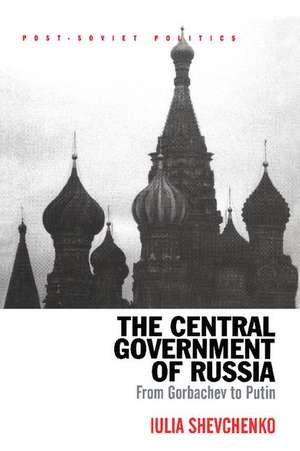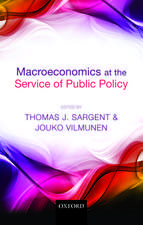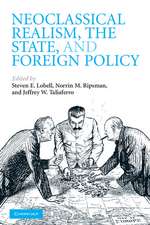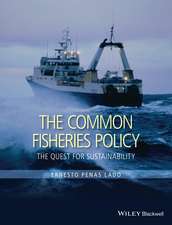The Central Government of Russia: From Gorbachev to Putin: Post-Soviet Politics
Autor Iulia Shevchenkoen Limba Engleză Paperback – 16 mai 2017
| Toate formatele și edițiile | Preț | Express |
|---|---|---|
| Paperback (1) | 341.55 lei 22-36 zile | +22.67 lei 6-12 zile |
| Taylor & Francis – 16 mai 2017 | 341.55 lei 22-36 zile | +22.67 lei 6-12 zile |
| Hardback (1) | 819.90 lei 43-57 zile | |
| Taylor & Francis – 3 sep 2008 | 819.90 lei 43-57 zile |
Din seria Post-Soviet Politics
- 22%
 Preț: 324.16 lei
Preț: 324.16 lei - 28%
 Preț: 739.39 lei
Preț: 739.39 lei -
 Preț: 465.91 lei
Preț: 465.91 lei - 18%
 Preț: 1005.46 lei
Preț: 1005.46 lei - 15%
 Preț: 669.94 lei
Preț: 669.94 lei -
 Preț: 376.37 lei
Preț: 376.37 lei -
 Preț: 489.26 lei
Preț: 489.26 lei - 18%
 Preț: 1114.70 lei
Preț: 1114.70 lei - 17%
 Preț: 247.40 lei
Preț: 247.40 lei - 15%
 Preț: 705.53 lei
Preț: 705.53 lei - 19%
 Preț: 259.07 lei
Preț: 259.07 lei - 16%
 Preț: 242.71 lei
Preț: 242.71 lei - 25%
 Preț: 769.00 lei
Preț: 769.00 lei - 31%
 Preț: 766.57 lei
Preț: 766.57 lei - 18%
 Preț: 1002.63 lei
Preț: 1002.63 lei - 15%
 Preț: 259.51 lei
Preț: 259.51 lei -
 Preț: 382.75 lei
Preț: 382.75 lei -
 Preț: 381.81 lei
Preț: 381.81 lei -
 Preț: 386.39 lei
Preț: 386.39 lei -
 Preț: 329.88 lei
Preț: 329.88 lei -
 Preț: 386.00 lei
Preț: 386.00 lei -
 Preț: 387.91 lei
Preț: 387.91 lei -
 Preț: 388.26 lei
Preț: 388.26 lei - 17%
 Preț: 258.09 lei
Preț: 258.09 lei - 17%
 Preț: 272.50 lei
Preț: 272.50 lei - 18%
 Preț: 1005.17 lei
Preț: 1005.17 lei - 18%
 Preț: 1007.48 lei
Preț: 1007.48 lei - 25%
 Preț: 496.94 lei
Preț: 496.94 lei - 18%
 Preț: 992.00 lei
Preț: 992.00 lei
Preț: 341.55 lei
Nou
Puncte Express: 512
Preț estimativ în valută:
65.36€ • 68.41$ • 54.40£
65.36€ • 68.41$ • 54.40£
Carte disponibilă
Livrare economică 10-24 martie
Livrare express 22-28 februarie pentru 32.66 lei
Preluare comenzi: 021 569.72.76
Specificații
ISBN-13: 9781138266506
ISBN-10: 1138266507
Pagini: 212
Dimensiuni: 156 x 234 x 15 mm
Greutate: 0.45 kg
Ediția:1
Editura: Taylor & Francis
Colecția Routledge
Seria Post-Soviet Politics
Locul publicării:Oxford, United Kingdom
ISBN-10: 1138266507
Pagini: 212
Dimensiuni: 156 x 234 x 15 mm
Greutate: 0.45 kg
Ediția:1
Editura: Taylor & Francis
Colecția Routledge
Seria Post-Soviet Politics
Locul publicării:Oxford, United Kingdom
Cuprins
Contents: A theory of government development: institutional design and delegation of authority; The late Soviet period, 1989-1991; Transition to independence, 1990-1991; Struggling with the Soviet legacies, 1991-1993; Accommodating to the new institutional design, 1994-1995; The end of the Yeltsin era, 1996-1999; Putin's first tenure, 2000-2004; Conclusion; Bibliography; Index.
Notă biografică
Iulia Shevchenko is a Research Fellow at the European University at St. Petersburg, Russia.
Recenzii
'Iulia Shevchenko...combines an insider's account of the contemporary Russian scene with a deep awareness of Western political science...Shevchenko provides a nuanced account of the changes that have occurred from Gorbachev to Putin in the power and authority of the different institutions of the central government...Students and scholars looking for a cool, commanding and detailed examination of this turbulent and exciting period will be greatly rewarded in reading this book.' Karen Dawisha, Miami University, USA 'Iulia Shevchenko...has performed a tremendous service to scholarship in compiling essential factual information about the composition and structure of the Russian government over a period of extremely rapid change.' The Russian Review 'This is the first detailed study of the role and activities of the Russian government...in the political system of the Russian Federation during the reign of President Boris El'tsin and the first term of President Vladimir Putin...a welcome and useful contribution...this study provides an extremely effective guide to the activities of the government of the Russian Federation during the last fifteen years.' Slavic Review '...this book fills an important gap in the literature on Russian politics.' Slavonic and East European Review
Descriere
Placing the development of the Soviet and Russian central governments in theoretical context, this work breaks new ground in the study of contemporary Russian politics. The originality of this work, rich with supporting evidence and empirical data, will ensure that it becomes the standard source for students and scholars concerned with this aspect of post-Soviet politics.













